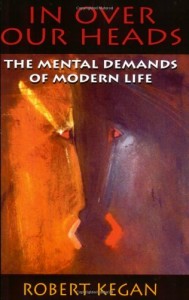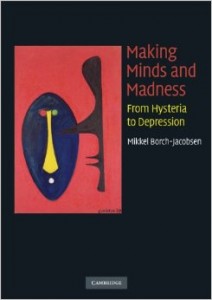
Octorber 5-11 was mental health week. You probably heard it mentioned on any of the following: radio commercials, TV programs, and social media blitzes. Chances are that you have struggled with some of the things that you heard discussed–the same goes for me. Abnormality is the new normal.
It is also probably true, as one of my former professors, Mikkel Borch-Jacobsen argues in his Making Minds and Madness: From Hysteria to Depression, that there are plenty of vested interests for pharmaceutical companies to keep manufacturing new mental problems that in turn will lead to the manufacturing new pills.

I took a long road trip with my sister yesterday. As she drove I read Walker Percy’s Lost in the Cosmos: The Last Self-Help Book out loud. I read through about 140 pages over the course of the day. This was far enough to hit upon some passages that relate to Percy’s thoughts about the roots of the mental health epidemic.
Percy takes a different approach from the media blitz, because he does not think that depression is merely a problem to be medicated away, but rather a rational response to the state of our world. He also differs from Borch-Jacobsen by arguing that the problem is largely real, but not really a problem.
Let’s start with how Percy takes a quick stock of modern life by answering the question why so many people are depressed:
Because modern life is enough to depress anybody? Any person, man, woman, or child, who is not depressed by the nuclear arms race, by the modern city, by family life in the exurb, suburb, apartment, villa, and later in a retirement home, is himself deranged.
We could add any number of deranged situations to the list: the growing income inequality gap, any number of looming ecological disasters, terrorism, the disappearance of the extended family, Ebola, AIDS, the fertility crash, and so on.
Once Percy accepts depression as a normal response, he proposes a revolutionary response to depression:
Now, call into question the unspoken assumption: something is wrong with you. Like Copernicus and Einstein, turn the universe upside down and begin with a new assumption. Assume that you are quite right.
You are depressed because you have every reason to be depressed. No member of the other two million species which inhabit the earth—and who are luckily exempt from depression—would fail to be depressed if it lived the life you lead. You live in a deranged age—more deranged than usual, because despite great scientific and technological advances, man has not the faintest idea of who he is or what he is doing.
Begin with the reverse hypothesis, like Copernicus and Einstein. You are depressed because you should be. You are entitled to your depression. In fact, you’d be deranged if you were not depressed. Consider the only adults who are never depressed: chuckleheads, California surfers, and fundamentalist Christians who believe they have had a personal encounter with Jesus and are saved for once and all. Would you trade your depression to become any of these?

Percy then explains that the Copernican revolution can be completed by becoming something he calls an “ex-suicide.” His reading of Camus, who famously said suicide is the only really serious philosophical problem, seems to influence him here.
I don’t want to give it away too much for those of you who have not read Lost in the Cosmos. All I will say is that it is as outrageous as the rest of Percy’s book and as outrageous as the mental demands of postmodern life are.
We truly are in over our heads and the first step involves acknowledging this as a fact and perhaps letting go of the rails. I suspect contemplative prayer might be a metaphorical soap for all the excessive dirt in our lives.
I’m pretty sure that the real soap pictured above can’t hurt either.












